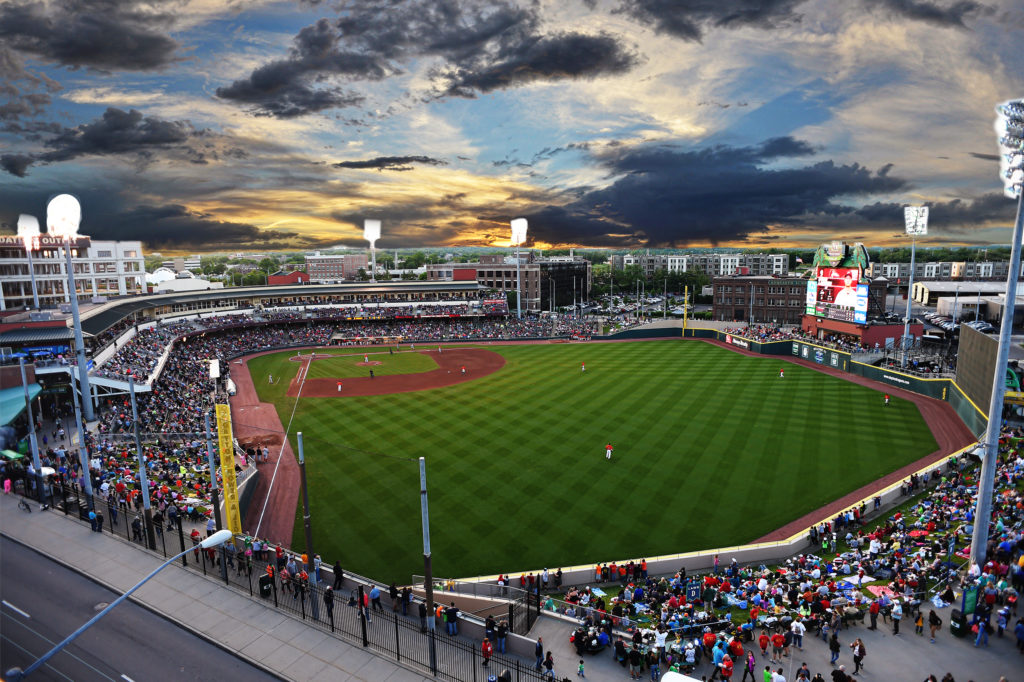The story of the Dayton Dragons (Low A; Midwest League) is one that has unfolded for nearly 20 years. Since its launch in 2000, the club has sold out every home game it has played and has been credited with running a strong operation at Fifth Third Field. Now in their 19th season, the Dragons continue to stand out as one of the more successful franchises in Minor League Baseball.
The Dragons came to be in 2000, when the former Rockford Reds played their first season after relocating to the new Fifth Third Field in downtown Dayton. Leading up to the team’s launch, the Dragons front office undertook an approach that, in hindsight, can be credited with helping to shape their long-term success.
“It probably goes back to our ownership group at the time,” Dragons president and general manager Bob Murphy said of Mandalay, which owned the team until selling it to Palisades Arcadia Baseball in 2014. “They wanted this to be the blueprint for what they wanted to build for Mandalay Sports. When they hired us, they were clear that they wanted things to be part of a first-class operation. From a marketing standpoint, from a ticketing standpoint, from an event standpoint, we really wanted to differentiate ourselves.”
Murphy and Dragons executive vice president Eric Deutsch have been a part of the organization since 1999, seeing the Dragons from their formation. In addition to building a strong following over the years—the club’s sellout streak is expected to reach 1,274 games after Thursday, and it broke a professional sports record in 2011—the Dragons have also led a steady operation. Murphy and Deutsch have taken a consistent approach to the game day experience over the years, one that involves evaluating individual components of Fifth Third Field and working to make improvements where needed.
“I think that we look at the operation globally, and each year we task our leadership group to make their individual areas better,” Murphy said. “We also gauge ourselves on the quality of the experience. We quality control the experience of our customers, from someone in higher end premium areas to someone in the group areas.
“You want to be here to see it and feel those efforts. We’re at the gates each and every night, and we’re constantly going around the stadium and stopping in different areas to talk to our employees and get feedback on the areas that they’re supervising.”
In his analogy, Deutsch compared the approach of accommodating fans at the ballpark to the experience of hosting guests at a house party. “You feel that you’re hosting a party at your home,” he said. “If you’re having people to your home consistently, you’re quality controlling the food, the cleanliness of the home, and every aspect of that party. Using that analogy, it’s the same with Dayton Dragons baseball.”
Community involvement has also been a focal point of the Dragons’ operations. This has taken shape through several endeavors, including the team’s long-running Dragons MVP Program—an initiative that allows fourth and fifth grade teachers in the five county area (Clark, Greene, Miami, Montgomery, and Warren counties) to hand out award kits to five students. That kit features several Dragons-related prizes, including four lawn tickets to an MVP Night at Fifth Third Field.
The Dragons’ role in the community has also been noticed in the area surrounding Fifth Third Field. Over the time that the ballpark has been in downtown Dayton, the area has seen a surge in economic activity, as Deutsch estimated that there has been $1.5 billion in documented development since Fifth Third Field opened.
Going forward, that community impact is something that the Dragons are hoping that they can build upon. “Our long-term goals would be to continue to be impactful in this community,” Murphy said. “I think we want to continue to have a successful ticket sales program, we want to continue to change our stadium—our physical plant and keeping it fresh and new for our fans that come back every year.”
Several changes have taken place at Fifth Third Field in recent years, including an overhaul of the AZEK Dragons Lair, a hospitality and party area in left field that was redesigned prior to last season. Prior to the 2018 season, the team made changes to its center field party deck, including the addition of new flooring.
Murphy and Deutsch give credit to the Cincinnati Reds, the Dragons parent club, for playing a major part in building a strong baseball tradition in the area. That tradition has extended to the Dragons, who are entrenched as their own baseball institution.
“A lot of credit has to go to the Dayton community,” Deutsch said. “They’re coming out in droves every year, buying ticket plans, buying corporate partnerships, buying group outings They’ve made Dragons games part of their summer calendar for a long time.”
Image courtesy Dayton Dragons.
This article first appeared in the Ballpark Digest newsletter. Are you a subscriber? It’s free, and you’ll see features like this before they appear on the Web. Go here to subscribe to the Ballpark Digest newsletter.

